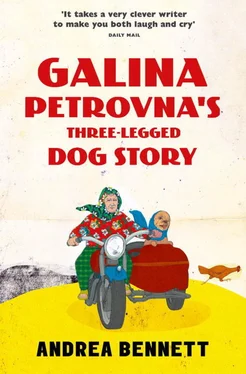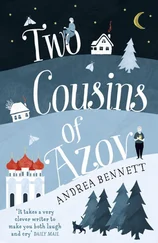‘Boroda, quiet!’ Commanded Galia in a voice that shook the walls. The dog released the policeman and retreated towards the stairs. Mitya scrambled to his feet and, pushing the wailing chubby policeman out of the way, grabbed the dog by the scruff. She yelped as he lifted her high into the air and suspended her over the stairwell.
‘Quiet, Boroda,’ commanded Galia again as the dog twisted and turned in Mitya’s grasp, trying to get at least one fang into the sinews of his wrist. Mitya watched the dog’s efforts, and smiled, briefly.
‘Citizen Old Woman, the only thing stopping me from dropping this thing over the bannister is the mess it would make on my boots when I stepped through it on leaving the building. Uncontrolled canines are vermin, and this vermin must be controlled. I am now taking charge of this animal and it will be exterminated. You have the paperwork. It explains your rights.’
He started down the stairs.
‘What rights?’ shouted Galia after him, desperate.
‘To the body: you have none. It will be burnt, along with other vermin,’ with a half-smile, Mitya marched further down the steps with Boroda still held at arm’s length by the scruff of her neck, still twisting, still whining.
‘Please!’ wailed Galia.
‘Kulakov! Wake up and take that man to the station! Three bottles, remember?’ called Mitya from the next floor down. Vasya was, by this point, seeing to the injured Officer Kulakov, helping him back to his feet and offering him iodine and cotton wool, which he waved away with an oath.
‘My apologies, Citizen Old Man, but it seems you must accompany me to the station. Bring any medication you may need. This may take some time. I really must arrest you, you see.’ Leaning on each other, they began slowly down the concrete steps, Vasya supporting the wobbling policeman to the best of his ability. They passed Galia as she watched Mitya disappearing into the darkness with her dog.
‘Go inside, Galia, and lock the door. I’ll be OK. Don’t worry.’ Vasya shot Galia a worried look, but failed to catch her eye: she was still watching after Boroda, receding into the darkness, whimpering and afraid.
‘Don’t worry, Galina Petrovna, I’ll be OK,’ he shouted louder, ‘and I’ll free your dog! Don’t give up hope! We live in a democracy. Dogs must be free, just as people must be free!’
The words pierced Galia’s thick bubble of shock. ‘Vasya, be brave,’ she said. ‘We’ll get you out. You’ll see. We’ll get you out tomorrow. You and Boroda. I’ll make sure of that. They have no grounds for taking you!’
‘Tomorrow? We won’t even have started on the paperwork by tomorrow, Elderly Citizens,’ mumbled Officer Kulakov as he folded Vasya into the back of his Zhiguli police car and then took his position behind the wheel. ‘OK Citizen Old Man, we’re just going to have a little nap before we set off for the station, so just make yourself comfortable. There’s no point us getting there before six. Nothing ever happens there before six. We may as well sleep things off here a bit, and then go in with a clear head, don’t you think?’
Up in the apartment block, Galia stumbled back in to her flat and clicked the door shut. In the kitchen, with no company save the empty dog box under the table and Vasya’s tea glass, still half full, waiting for him to complete his toast to the bright future, she began to shake. The only sound now was the clock, ticking away the quiet, lonely night, with an occasional soft bong to mark the march towards dawn.
Galina Petrovna did not sleep well. After struggling to undress, feeling like an old woman, maybe the oldest old woman in the town, or even in the whole of Russia, she eased her way into her favourite, most comforting poplin night dress and lay on her bed, exhausted but wide awake. She was barely able to unwind her lids and shut her eyes, let alone nod off. Her eyeballs stuck to her eyelids; there was no comfort in her head, and no restfulness in her body. She lay taut on top of the covers and stared at the top of the wardrobe door. After several minutes listening to herself breathe, she sighed and gingerly pushed herself vertical. This would not do.
With a solid determination to be sensible and not give in to needless and unhelpful despair, she tried all the methods in her repertoire to relax into sleep as the night wore on. She started by sitting at the kitchen table, wrapped in a blanket, making scratchy lists of jobs to do in order to empty her brain; then she walked the floor with deliberate, certain steps, no doubt annoying the light-sleepers downstairs but feeling the need for movement; she cleaned the kitchen cupboards, clanging about at three a.m. and finding four dead cockroaches, two bottles of tomatoes from 1975 and a mouse trap (empty); she forced down weak tea with so much added jam you could stand a spoon up in it; she had a bath with oil of lavender so strong it took her breath away; and eventually, giving in, she took a tablet. Galia wasn’t one for tablets: the only discernible effect of this one was to turn her water green for the whole of the following day. Still she did not sleep.
At five a.m., after several half-hearted attempts at a gardening crossword, she went back to bed feeling cold and despondent despite the promising glow of the rising sun. She turned from one side to the other and then back again, replaying all the events of the evening and things that could have turned out differently, and most of all chiding herself for being a stubborn old idiot and not getting the dog a collar from the outset. If only she hadn’t stood on a principle, none of this would ever have happened. Poor Boroda would not be awaiting execution, and old Vasya would be asleep in his own bed instead of languishing in some prison cell far across town. And slowly, once all the scenarios had been churned over and re-jigged to exhaustion and started getting jumbled up with one another in her tired mind, she absently and unwittingly turned to examining problems further back in time: situations, places and people she had left behind a long time ago. The theatre behind her eyelids was filled with scenes and characters about whom she hardly ever thought when she was busy with her garden, her card games, her vegetables and her Boroda.
She dozed fitfully, and remembered a time when she was young. Back then, when things were different, life was properly difficult and her memories of it were dark. She remembered clattering footsteps in the stairwell, and the dry choking dust coming off the unmade roads in huge silvery plumes all summer. It was a time when work was a twelve-hour day at least, and sparse summer harvests had to be made to last all winter. When they first moved in to the apartment, the electricity, which they were very lucky to have, went off in the evening. That was no great problem, as they had no fridge and no TV, and generally no need for light after eight p.m. In those days, the lazy got nothing, unless they were the bosses, in which case they got theirs and a slice of everybody else’s, and more besides. She remembered her elderly neighbours: they were respected, but had nothing, and hoped for nothing, except maybe a better future for their grandchildren, if they survived. She tried to visualize the faces of some of those friends and neighbours who had gone away years ago and never come back, but the images were smudgy, lacking detail. Too much time had passed. There had been no miracle reunions, no matter what the films in the mobile cinema tried to make you believe. The disappeared did not come back.
The war had left Galia an orphan, but found her a husband, for which she was grateful. The move from active duty to dealing with the burdens of married life came very quickly. Galia found her new domestic chores rather stifling: occasionally, her heart beat fast against her ribs and she felt a little nauseous, a little trapped, a little desperate, sitting on her stool in the stuffy flat, waiting for Pasha to return from the factory.
Читать дальше
Конец ознакомительного отрывка
Купить книгу










